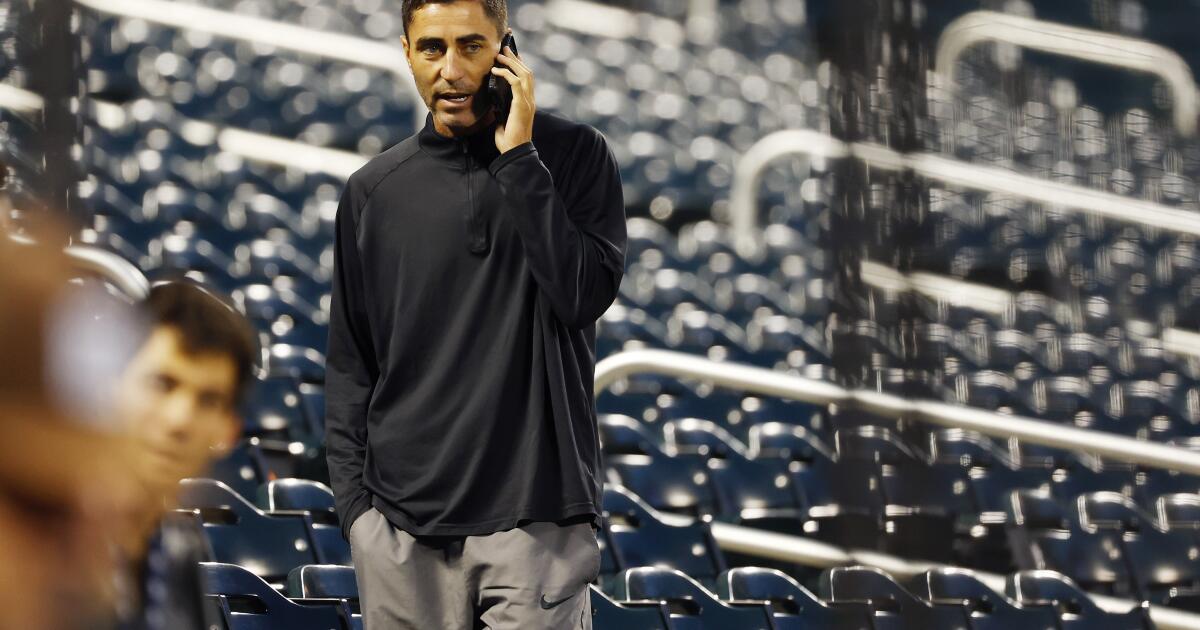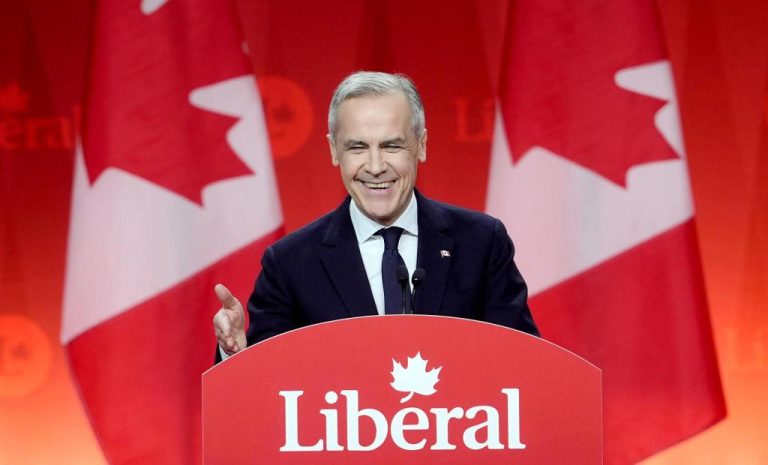
Translating A.J. Preller’s public comments can be a difficult task, especially when he works so hard to impart so little.
But through all the obfuscation, what Preller said Wednesday after Bob Melvin officially was announced as manager of the San Francisco Giants was crystal clear:
Preller is focused on finding a partner as he enters his third manager search in five years. And Melvin was not that partner.
In a half-hour video conference with reporters, Preller did not take any overt swipes at Melvin. But in almost every explanation of what the Padres would be looking for in a manager, Preller implied what he felt the team didn’t have the past two seasons.
“That getting-better process and constantly talking about how you get better, continuous improvement, and not looking at that as a negative but a positive,” Preller said, “I think that’s something that myself, others in the organization and the manager need to be on the same page with.”
Not much ambiguity there.
Melvin was presented with virtually all the quotes that appear in this story and opted to not engage in a tit-for-tat.
“I thoroughly enjoyed my time in San Diego,” he said. “The players there were fantastic, the fans were off the charts. I just feel that with the narrative spun toward the end of the year (that) seemed to grow and wasn’t going away, I recognized that the best thing for the organization and everyone involved is moving on. … I was fully committed to coming back. But based on further conversations after the season, I’m not sure the feeling was mutual.”
For Preller, who remains in his role as Padres President of Baseball Operations going into his 10th full season, moving on involves hiring a manager with whom he shares a vision of how a team is run.
To help the rest of us move on, what follows is a collection of what Preller says he is looking for in a manager — along with some facts and context:

Padres general manager and president of baseball operations AJ Preller watches players during a February workout in Peoria, Ariz.
(Meg McLaughlin/The San Diego Union-Tribune)
Collaboration, communication
Preller and Melvin never really shared much beyond a desire to win. That was enough to get them through a successful first season. But disparate views — on roster building, types and timing of preparation, the value of certain information, what is asked of coaches and other contrasts — proved too much to overcome amid the fraying effect of losing during their second year together.
By the end of ‘22 and throughout ‘23, there was a perception among those in baseball operations that Melvin did not want input. Those people felt there was at times virtually no collaboration between the manager and certain members of his staff and those in player evaluation and analytics. (Some close to Melvin indicated at the time there was a difference of opinion on the value of the input being provided.)
Preller runs on input and collaboration. His desire for information is seemingly insatiable. He surrounds himself with advisers, and they are liable to talk at all hours of the day.
It is not all that rare for someone to get a text or call from Preller at 3 a.m.. and then again at 6:30 a.m. The topic of a conversation may be a trade that is about to happen or could happen or about a certain player’s need to work on one thing or another.
Preller wants that from everyone around him, and had to accept that there were certain hours and topics that Melvin, who spent 12 hours a day at the ballpark, was not interested in engaging.
“We’ve got different departments here that contribute to winning,” Preller said. “And making sure that everybody is on the same page and communicating, that’s probably my biggest job. I think as we go forward to the next manager, we’ve got to make sure we have somebody that from that standpoint — wanting the best information, wanting to use our resources as an organization and myself kind of over the top, trying to coordinate it all — that’s something I’ve got to really focus on to make sure we nail that.”
Preller said the Padres “did (have that) at different points in the last couple of years,” but also seized on a sentiment Melvin expressed in his introductory news conference in San Francisco.
“I think, as Bob alluded to, he felt (the Giants were) a little better fit,” Preller said. “I think we’ve got to find a manager that fits our group and organization right now.”
Preller did acknowledge he could have done better “to make sure that the manager feels comfortable.”
No one on either side of what was termed by one person intimately involved as a “Civil War” between Melvin and Preller would argue that.
“I think that the idea is you want somebody that’s here for a long time,” Preller said. “… But it’s like anything: you look at any kind of partnership, it takes two. I’ll constantly look back and say, ‘Hey, how can we do this different and what does it look like?’ Because you want to hire a really talented person, and hopefully they’re here for a decade.”
While managers rarely last anywhere close to 10 years, Preller has not had one stick half that long.
Indeed, the popular (and easiest) narrative to perpetuate is that Preller ran off another manager. That is largely because Melvin was the Padres’ fourth full-time manager since Preller’s first full season in 2015. Andy Green, who made it within nine games of four full seasons while the Padres were rebuilding, almost doubled the tenures of Jayce Tingler (2020-21) and Melvin.
Melvin isn’t the only one to push back on Preller’s relentless energy. Multiple managers and coaches have over the years talked about the exhausting nature of Preller’s perpetual fount of ideas and what they interpreted as his interference. However, narratives can be like a brush fire, feeding off themselves and spreading wildly.
Whether it is because he is trying to reinvent the wheel or because he hardly sleeps, Preller can be difficult to work for. Of this, there seems to be little doubt, even as several people who have worked for him for several years say any such notion is almost entirely a product of his relentless drive for success.
Many people — including those who have been close to him — say Preller can push the boundaries of truth. Sometimes, that seems to be in the name of guarding information. Sometimes, people see it as nefarious, which has served to feed a lack of trust. Several anecdotes told privately by those who have worked for Preller say he essentially talks in circles when he does not want to give an answer, a concept that rings true for anyone who has listened to his news conferences.
Preller’s communication issues also range somewhat contradictorily from desiring many voices to sometimes not speaking consistently enough with those outside his inner circle.
All of his former managers have confirmed Preller does not insist on lineup changes, bullpen usage or other in-game strategies. However, his strong convictions and relentless attention to certain issues tend to convey a sense of insistence, which can wear down subordinates (such as a manager) and/or lead to a suggestion being interpreted as a demand. These things seemed to happen a fair amount in the interactions between Melvin and Preller.
“Our environment, at least the way I work, it’s very open, it’s very collaborative,” Preller said. “We feel like we have a lot of really talented people in the organization and try to get everybody on the same page. Obviously, the last couple of years, we didn’t quite get that right. We’ve had different periods over the last few years where we have, but I think as far as being the GM and the president, it’s a big part of my role and responsibility. And I’m gonna look back at the last couple of years. There’s different points in time, and you learn from it.”

Padres pitcher Joe Musgrove drenches A.J. Preller after the team clinched a wild-card playoff spot in 2022.
(K.C. Alfred/The San Diego Union-Tribune)
More involved?
The important thing would seem to be that Preller actually does learn and alter course. Because the evidence suggests he has not.
After assessing breakdowns in his relationship with Green, Preller and former Padres Executive Chairman Ron Fowler determined Preller would focus on being around the team more during the 2020 season. This was even before the COVID-19 pandemic hit.
During the abbreviated 2020 campaign, with no scouting to do and those in the “bubble” essentially needing to stay inside the bubble, Preller interacted with Tingler, coaches and players more than ever. The team finished with MLB’s third-best record (37-23) and won a playoff series.
“I think in ‘20 there was a lot of communication,” Preller said. “It was probably the year that personally I was most active and involved in the big-league team, and it was because of COVID. There really wasn’t anything else to do, and everybody was locked in. It was a very unique time. I feel like our group played well. And the biggest thing was because there was communication constantly between players and staff, staff and myself, training staff and (research and development, commonly referred to as the analytics department).”
Preller has spoken before and did so again Wednesday about his belief Tingler, the coaching staff and baseball operations were largely in lockstep in 2021. For that, he has said, he was less present and resumed his frenetic travel schedule, scouting and checking on Padres minor-league affiliates. Preller did seem shocked at the time to learn of some of the clubhouse and coaching staff issues that developed that season.
He and Padres Chairman Peter Seidler vowed fixes.
Melvin, a three-time Manager of the Year, was supposed to be among those fixes.
While he watched virtually every game and communicated almost daily with Melvin via text or call or through one of his assistant general managers, Preller was not around the team all that much in ‘22 or ‘23.
“I think probably I didn’t communicate as well in the last few years, kind of out of respect for Bob and different things,” he said Wednesday. “I think probably like that constant communication, I think it’s something that we make sure that we get right here this year. … The key is just making sure there’s good cohesion between the different departments and the different groups. I feel like going back to that ‘20 season, I think it was pretty clear, the focus (was) on the big-league team and the involvement and kind of what that dynamic looks like. … Ultimately, the biggest thing is we have really good players. Because of that, we’re always gonna have a chance every single year with that talented roster. I think making sure the communication and the proper things are in place to give the players a chance to play their best, to make sure they’re getting the best information, that’ll be a big focus for me here this year.”
So a man viewed as being too involved will in some ways be more involved going forward.
“I just think in terms of like, the day-to-day being around, the communication, being present in terms of getting a lot of people on the same page. I’m not saying that was nonexistent here in the last few years. That’s not the case. But just making sure that everybody is on the same page, and there’s some big-picture vision and there’s that constant communication,” Preller said.
“There (have) been times here in the last few years when we’ve done that. There (have) been times I have kind of backed off and thought we had it. And I think probably the biggest learning is like you really never have it. It’s this constant. When you sit down at the end of the year and get a chance to talk with our players and our coaches, it’s just like, ‘Hey, just making sure next year that, you know, we’re not going three weeks without sitting down and reviewing something.’
“Kind of like that sense of urgency that we didn’t quite have this year in that 162-game season, how you navigate that. You really do it just by talking and communicating and getting the feedback from your group and your players and your staff. They do a great job in providing that. I think just being very present for that and a part of that situation. You’re not over-the-top running the day-to-day of that. That’s your manager and your staff. But just kind of being part of that as the year goes on in a long season, I think that’ll be a bigger part of my attention here this year.”
Preller naturally pushes back on the idea that he wants a sycophant as a manager. The fact is he largely had one of those in Tingler, who had never managed, was a longtime friend and came in matching Preller’s relentless energy and sharing his vision. And it is also true that someone aligned with their boss’s ideals does not necessarily have to be a puppet.
Still, while Preller extolled the virtues of the job and said multiple “accomplished” men were interested in becoming the next Padres manager, it seems unlikely he replaces Melvin with another longtime manager who would arrive with an established way of doing things different than his new boss.
“You’re always excited when you get a chance to add somebody talented to the organization, especially (since) we feel like we have a good group from a player’s standpoint,” Preller said. “So I think the attention really just goes to getting the right manager, getting somebody in here that is going to be able to work with the players. And I think the shared vision is an important thing. I think that’s something we’ve got to make sure. That doesn’t mean — like something that I’ve seen written in the past — a ‘yes man.’ We don’t do that in any part of the organization. All of our conversations start with, ‘Speak your opinion, say what you feel.’ The only thing we get pissed (at) in meetings is when you don’t say what you feel, when you walk out the room and maybe say something different. So we try to encourage that throughout, in every conversation we have.
“And I think we’re looking for people that want to come in and bring ideas and then when we agree and go forward and test it out and see how things work. I think we’re excited to have somebody that has that shared vision, that’s willing to disagree and then commit and, ultimately, somebody that kind of views winning in the same way that a lot of people in this organization do.”





